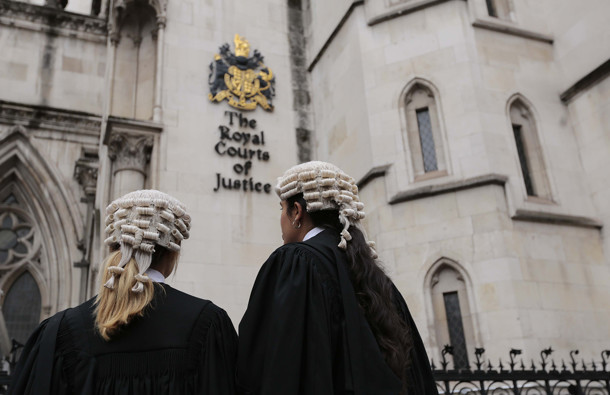
The Future Lawyer Weekly Briefing – W/C 18th November 2024
November 17, 2024
The case for nationalising the water and energy industries
November 20, 2024Daniel Sokol is a former university lecturer and a practising barrister at 12 King’s Bench Walk, London, with a specialist interest in clinical negligence and education law. The latest directories describe him as a ‘great advocate’ (Legal 500) and a ‘meticulous magician’ (Chambers & Partners). He is the Founder of Alpha Student Hub (https://www.alphastudenthub.co.uk/), a one-stop shop for students in need of legal, psychological or educational support. He has recently started a TikTok channel giving legal tips to teenagers (https://www.tiktok.com/@aypgtlawandjustic).
He has sat on committees for the Ministry of Justice and Ministry of Defence, and is the current Chair of the Metropolitan Police Research Ethics Committee. He is also a semi-professional magician.
Interview questions related to being a barrister
- Can you tell us about your journey to becoming a barrister and what inspired you to pursue a career in law?
It was a non-conventional journey. I studied modern languages at university and, in my second year, I lived with medical students. All they spoke about was medicine and I developed an interest in medical history (which continues to this day). The interest in medical history led to a Master’s in the subject, and then a related fascination with medical ethics. I eventually studied for a PhD in medical ethics (on whether doctors should always tell patients the truth) and taught the subject in medical schools.
After a few years, I grew tired of marking exams and sitting in dull meetings. Encouraged by a school friend who was a solicitor, I re-trained as a lawyer and that’s how I ended up at the Bar.
- What made you choose your particular area of practice?
Clinical negligence combines copious amounts of medicine and the human side of the law. You feel you are making a difference to people who are often in desperate need of help.
I got into education law at the end of my pupillage. A friend asked me for help appealing a failed PhD. After we won the case, I set up Alpha Academic Appeals. We now have a team of 14 barristers who help a wide range of students, from those sitting fitness to practise proceedings to those accused of sexual misconduct.
Unfortunately, there is a lot of cheating going on at universities at the moment, not least with ChatGPT and generative AI, and we are seeing many students, including law students, who have been accused of academic misconduct. For law students in particular, an allegation of academic misconduct involving dishonesty can be career-threatening.
- What does a typical day look like for you as a clinical negligence barrister?
The beauty of this profession is that there is no typical day. I may be in court, or in a conference with solicitors, or visiting an injured client in their home, or researching a point of law, or writing an Advice on quantum or a skeleton argument, or negotiating in a Joint Settlement Meeting, or giving a lecture to solicitors, or writing an article for a publication. It is wonderfully varied.
- How much of your time is spent in court versus doing paper work?
In my first few years of practice, I was in court every day, and sometimes twice a day. It was exhausting but invaluable in terms of developing your advocacy skills. As I progressed, the paper work increased and the court work reduced. In clinical negligence, few cases reach trial, so the majority of the court work is interim applications, case management conferences, and approval hearings.
- Can you describe a particularly memorable case you’ve worked on and what you learned from it?
Tempted as I am to talk about a case involving a malfunctioning prosthetic penis, I would say my most memorable case was the client with a condition called Klinefelter’s syndrome. The condition is caused by an extra X chromosome, and can result in significant physical and psychological problems.
My client was diagnosed with this condition in 1968, when he was just 13, but the doctors decided not to tell him or his parents. They believed, wrongly, that nothing could be done to help him. The client only discovered the truth, accidentally, 50 years later, after a life of utter misery. It was a tragic case of repeated paternalistic deceptions, which we eventually settled for a sizeable sum.
- What has been your most challenging experience as a barrister so far?
If you do catastrophic injury work, you will deal with human suffering on a regular basis and that can be emotionally difficult, especially the death of children. Some years ago, I did a Mental Health First Aid course to help me understand better the psychological side of things.
I also work relatively long hours, usually to 22:00 most evenings, and on weekends. I say ‘relatively’ because people who work in some areas of finance would consider that to be a half day!
- What advice do you have for law students who are trying to decide on a specific area of law to specialise in?
When I was at law school, there was some pressure to choose a specialty early on but I don’t believe there’s a need to commit yourself so soon. There are advantages in adopting a broad-minded approach to specialisation. In my first few years, I covered a wide range of law, including personal injury, land law, and tax, and I was surprised by how much I enjoyed areas of law which I thought I would dislike, like VAT law. Even today, it is rare for barristers to specialise right from the start of their careers. It took me several years before I could specialise in clinical negligence.
- How do you maintain a work-life balance in a demanding profession like a barrister?
You have to work hard to succeed at the Bar, especially in the first few years, but it is important to keep a sense of perspective and devote some time to family, friends, sports, and hobbies.
I helped a boxing coach pro bono recently and he kindly offered me some personal training sessions as a thank you. That’s done wonders for my fitness and takes you mind off work.
- Tell me about your magic?
I caught the magic ‘bug’ when I was 12 or 13. One summer, my father, who is also lawyer, agreed to represent a client who had no money in exchange for a 1-week intensive course in magic for his children (i.e., my brothers and I). It was so much fun.
At university, I joined a magic club and started performing for money in restaurants and at weddings. In 2014, I passed the examinations to gain entry into the Magic Circle, a prestigious society for magicians. Magic helped me get pupillage as, in my interview at 12 King’s Bench Walk, I borrowed a £20 note from one of the silks on the panel and transformed it into a £50. They must have liked it as they offered me a pupillage!
I still use magic from time to time. A few weeks ago, I had a conference with a 12-year-old client and showed him a few close-up effects while we were waiting for everyone to join. Going to see a barrister in Chambers, with solicitors and medical experts around the table, can be a nerve-racking experience for anyone, let alone a child, and I’d like to think this made him feel more at ease.
- What advice would you give to individuals hoping to obtain a pupillage, but are consistently facing rejections?
You need to be honest with yourself and ask why this is happening. Seek the advice of trusted third parties to help you assess the situation. Should you persevere or look for other options? The heavens will probably not fall if you don’t get pupillage.
- What skills and qualities are essential to succeed as a barrister?
Sound judgement, clarity of thought, hard work, solid interpersonal skills, mental toughness, and a high standard of ethics.
- How do you handle high-pressure situations, particularly during cross-examinations or difficult client meetings?
I prepare thoroughly for everything I do. I was once led by a silk in a high-value personal injury case. As is commonly the case, the conferences with experts are conducted by the silk. One day, we had an important conference with 8 experts and the silk called in at the start of the meeting. “I’m stuck abroad”, he told the assembled group of experts and solicitors, “so Daniel will lead the consultation”. Thankfully, I was well prepared and it all went smoothly.
I also believe that pressure is something that you put on yourself. Once you realise that pressure is all in your head, it is much easier to control.
- Is there anything you wish you’d known when starting out in your career?
It’s all about the client, not you, the lawyer.
If the client recognises that you have given your all to help them, then they will usually be grateful whatever the outcome.
I’ve put down some of my thoughts about law and lawyering in my latest book, co-authored with my father, A Young Person’s Guide to Law and Justice (2024, Book Guild), but there are lots of other books by lawyers on this subject. I recently read Michael Tigar’s Nine Principles of Litigation and Life, which was wonderful.





